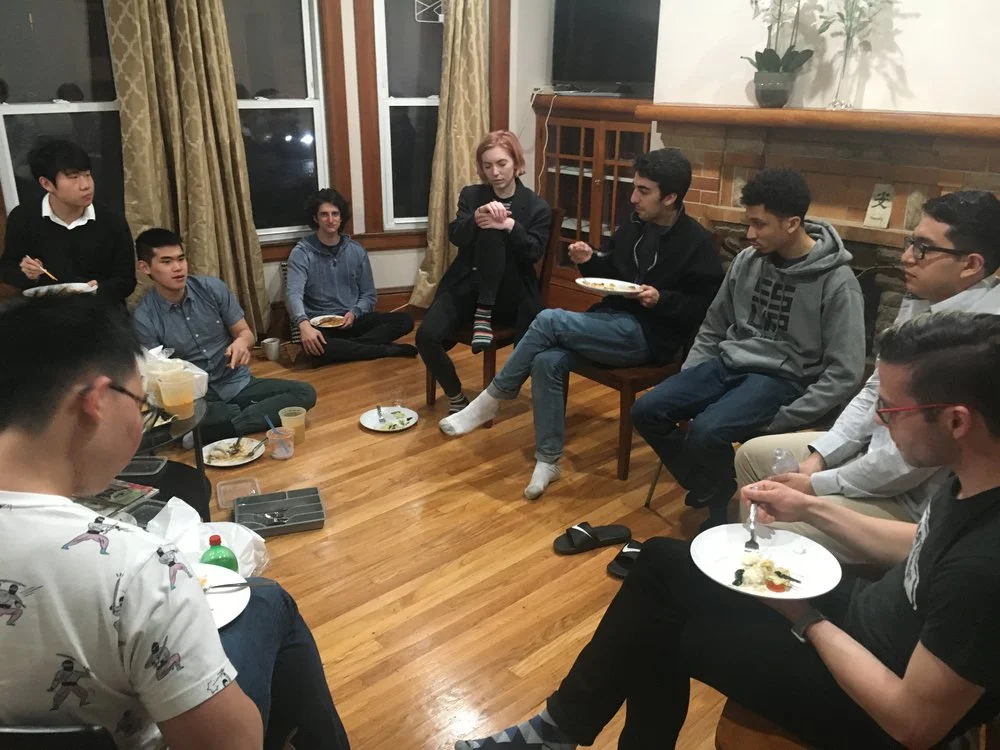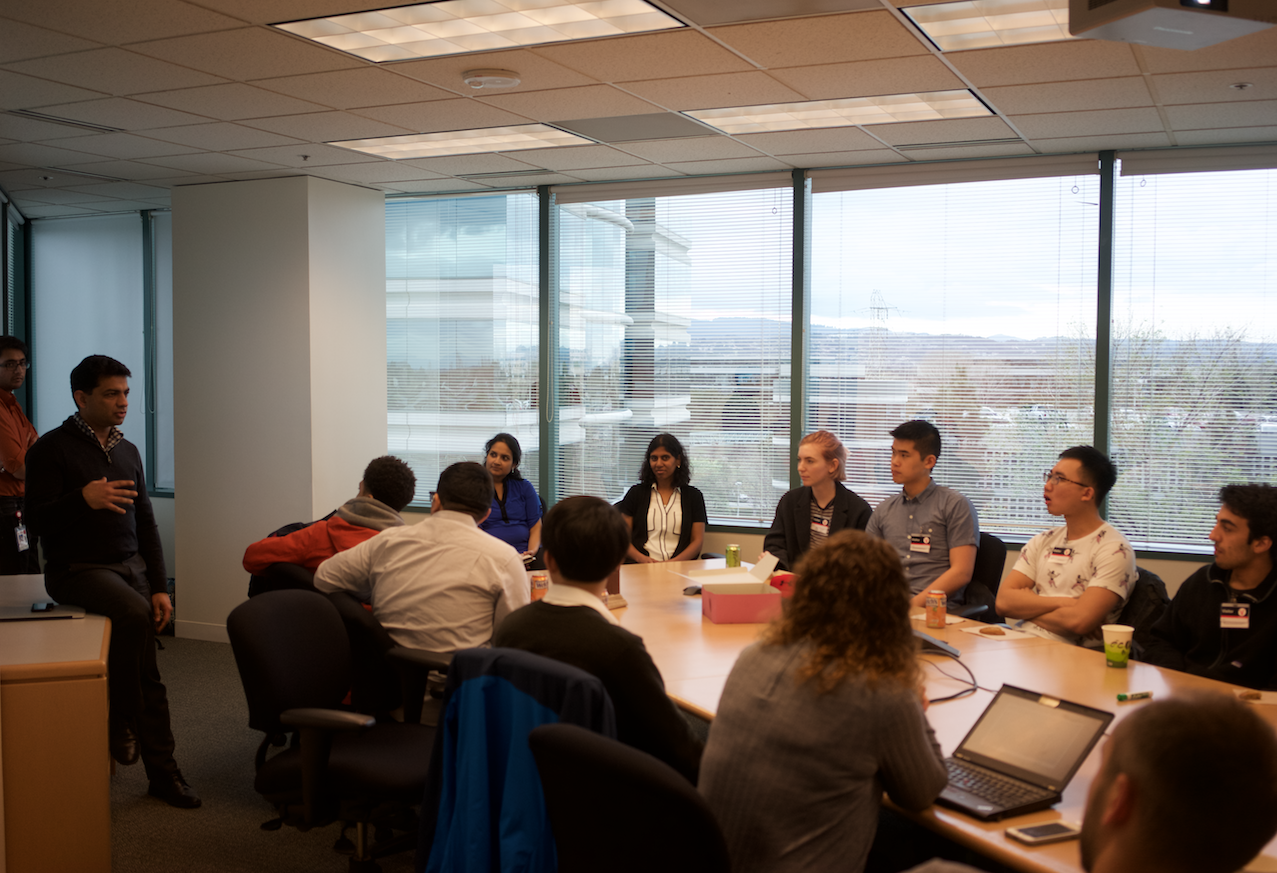Students visited Oracle Corporation to meet with Rhonda Stieber (RPI Class of '88) and her team. They also had visited Sense Inc. to talk to Alex Rosen '08. Lastly, they had dinner with Erik Islo '15 (Apple). Monday's reflections are written by Huaiyu Chen '20 and Taj Richards '20.
Huaiyu's Reflection
Huaiyu is a member of the class of 2020 from Inner Mongolia, China planning to major in Economics. Through service with Kai Entrepreneurship, Hand in Hand Rural Educational Service, and as a Chinese Language Tutor, Huaiyu is interested in using technologies and innovative ways to both improve educational opportunities for children growing up in China as well as to educate people here in America about Chinese culture.
Monday marked the start of the Kai Wesleyan trip to Silicon Valley, where we met up with friends and alumni who are widely active in the tech industry. Our first visit was the Oracle Headquarter, one of the most successful and iconic companies in the Valley. The Oracle headquarter is located at Redwood City, which is in the south of San Francisco. Oracle has been headquartered at this campus since 1989. We later learned that this two million square foot campus consists of eleven 8 to 16 story buildings that are a composition of rectangular and cylindrical forms. Inside these buildings, there is a conference center, an auditorium, a fitness center, and different cafeterias ranging from American Grill to Chinese Cuisine.
We had the opportunity to speak with Rhonda Stieber, who is the Vice President at Oracle, also a project manager director that leads a team of 81 people. During the meeting, we learned that Rhonda and her team specialize in providing professional software applications for enterprises, especially Fortune 500 companies. Interestingly, during our meeting, we learned that even other tech giants such as Google and Facebook use Oracle software for productivity. Yet Oracle is very different from what I imagined. It is a traditional company where every employee has their own office, unlike Facebook or Slack where everyone works in an open space. Through the powerpoint presentation, we learned that Oracle is a database company. It was founded in 1977, long before there was Google, Yahoo, Amazon, and Facebook. We also learned that during the past years it has taken steps to develop cloud applications for enterprise computing.
From talking with project managers, we learned that in terms of project development, they are making a transition from using the Waterfall model to the Agile model. Waterfall works in a series of phases that starts with gathering requirements and ends with testing in a fixed timeframe. Agile model, however, values collaboration and responding to change over hard-set processes; developers work closely with their client base to develop the project. Rhonda told us that using Agile model for software development has significantly expedited the speed of software development. Overall, I was impressed with the professionalism of Rhonda and her team; they were well prepared and gave us a perspective of what a traditional tech company in Silicon Valley looks like.
Our next visit that day was Sense, a startup company located near the heart of San Francisco. Through talking with Alex Rosen, the CEO of Sense and a Wesleyan Alumni who majored in CSS, we learned that Sense aims to provide technological services and platforms to help companies engage better with its workforce. Alex noted that the advantage of Sense is that it has is no direct competitors. Sense Platform is a unique add-on application on top of the developed platforms, which has a great growth potential. Overall, Sense has a completely different experience than Oracle in which everyone works together in an open environment. However, it seems like Sense’s team members have good chemistry with its small size, and they are very passionate about what they are doing.
Last but not least, the last meeting for Monday was at the Airbnb we stayed at in San Francisco. Our guest was Wes alumni Erik Islo, who majored in sociology at Wesleyan and worked at Apple’s Map Development Team. By having a dinner discussion with Erik, we were exposed to a conversation that was different in substance that the meetings at Oracle and Sense. Erik told us that his job in the Map Development Team was working on placing the locations of photos. Erik also connected his experience working at Apple to social issues and struggles that occur in the Bay Area. For example, he talked about the gender and race imbalance in the tech industry as well as the educational inequalities in America. Erik commitment to social justice has inspired me because I am also interested in social justice, especially about educational inequalities. After the discussion, I believe working at the tech and entrepreneurship field would be a great way to make contributions in solving these social issues.
Overall, the first day of the trip gave me more exposure about working culture in different companies in Silicon Valley and sparked my interests for the tech industry. Tech industry is an area that I had never previously considered. I have always figured that I would go down the grad school path. This trip helped me think about my education here in a broader sense as it showed how my potential degree of Economics can actually be practice because I learned that I don’t really have to be an engineer to work in the tech industry as Alex Rosen was a CSS major and Erik Islo was a sociology major. I believe I can make more sense of how the skills I am learning can be applicable to outside of the classroom, and the usefulness of a liberal arts education.
Taj's Reflection
Taj Richards is a freshman who is planning to double major in Computer Science and Economics. He is a member of the Wesleyan Mathematics and Science Scholars Program, a two-year program that helps students get acclimated to the rigor of the math and science departments at Wesleyan. Having had some experience in high school with programming and designing and programming an autonomous robot with two friends for a sumo wrestling competition during a summer institute session, Taj is very interested to work in Silicon Valley designing software and heading initiatives that give the general public an opportunity to learn how to program.
Our first day started out at the Oracle Headquarters, located at Redwood City, which is in between San Francisco and San Jose. We arrived coming in three Ubers with three to four people each; a trend that would continue until we got a minivan from Zipcar the next day. The Oracle campus featured four cylinder-shaped glass buildings situated next to a large pond. It was a little difficult for us to the locate the building where we were supposed to meet up with Rhonda because of the building being identical to each other. Once we found the right building, sitting inside and waiting for Rhonda, I’ve noticed that the lobby was that of a typical office lobby – with the usual receptionist, uniquely-placed couches, tables placed near the window facing the pond, and a television that displayed Oracle’s innovations.
Meeting with Rhonda and her team kicked off my Kai Wes Silicon Valley Trip experience on a positive note. Her and her team specializes in providing software applications for enterprises, and you could really tell that they knew what they were talking about, from the presentation of the company to the short introductions of the team members. Rhonda brought out team members that varied in software engineers to project managers (a position that I was not familiar with until then, some of the Wes alumni that we met at other companies were involved in project management), and veterans of Oracle to a recently hired employee. Even though I wasn’t familiar with what Oracle’s purpose was in the tech industry, from the responses that Rhonda and her team gave us pointed out that Oracle is something of an OG in Silicon Valley compared to the likes of Google and Facebook. I was really impressed with the training program and the methods that the higher ups give to their new recruits; a program that places the new employee in different projects so that they can contribute to them and develop the skills they need to spearhead major projects in the company. Oracle does a good job in giving their employees a good amount of time to work on their projects. Rhonda and her team members really went in depth on the intricacies of working with their client base; the process of how a project gets handled, deciding whether their clients have agency in editing their applications, what clients they want to work with, etc. What was lacking in our meeting with Oracle was the diversity of the people that Rhonda brought out for the meeting. For an African American like me, it would have been nice to see African Americans and other minorities who are on her team other than Indians.
Our next visit that day was at Sense Inc., near the heart of San Francisco. Sense is a startup company whose aim is to provide technological services and applications to help companies engage better with its workforce. Alex Rosen, who is the CEO of Sense and is a Wesleyan alum noted the volatility of contingent workers (people who don’t have full-time positions at a company) and how Sense is a great resource to help contingent workers in keeping their positions. Sense has a completely different experience than Oracle in where this company doesn’t have a campus, a small amount of employees, isn’t well known, and is generating a lot less in revenue. However, Sense’s employees seem to have good chemistry with its small size. In talking with Alex, he noted that even though he was a CS major at Wes, he didn’t jump straight into the startup world. He recalls working at a larger tech company like Google and medium-sized ones like Gree and Funzio which gave him the, skills and experience to create his own startup. This is a path that I may consider taking after getting my CS degree. We asked him about the process of handling their client base, his experience at Wes, what his client base consists of, travel opportunities, a typical day at Sense, and more.
The last meeting of the day was at the Airbnb where we stayed at for our time in San Francisco. Our guest was Erik Islo, a Wes alum who worked at Apple. Through eating Thai food and having a discussion with Erik, we were exposed to a conversation that was different in substance that the meetings at Oracle and Sense. Erik works developing the Maps feature in iOS, and he has worked on placing the locations of photos. In my opinion, our conversation with Erik was the most thought-provoking out of all of the meetings in this Silicon Valley experience. Erik connected his experience working at Apple to real-life issue that occur in the Bay Area. His commitment to social justice at the workplace made us consider on our reasons to be interested in tech and entrepreneurship. We were able to throw Erik a lot of different questions, and being the knowledgeable person that he is, answered them eloquently and constantly tied them to the bigger picture.




